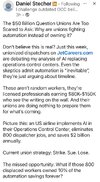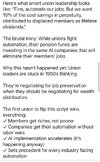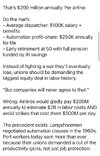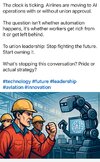I appreciate your optimism, really I do. And that all sounds pretty rad. It is also the exact opposite of how I see this going down. Greed smothers all kinds of good ideas and utopias. I do not see AI is a means to an altruistic and work-free world. It will usher in an era of incredible autocracy from a very few, who will hold the masses as servants. I hope I'm wrong, but I really don't think I will be.
And you'll be wrong

- that's fine, you're entitled to your opinions - but for autocracy to take hold literally everyone has to lay down and decide to let it take hold. I can promise you that at least one person in this thread will not lie down. They'll have to kill me first - which is fine - I've faced death before, I can face it again. No, this idea that people will simply bend over and take it is based on a reading of history that misses all the relevant context of the times - we don't even have real luddites yet. There's nobody setting fire to datacenters to "burn the looms" or whatever - we're actually doing this pretty chill so far. The catastrophism isn't warranted and instead of watching all this shell shocked and depressed (which, hey, I've been there, don't get me started on the climate) - I'm going to
do something. First to protect my family, then second to build the version of the future I want to live in.
This current milieu of • will pass. It may pass at great cost, but it will pass.
I think the road is going to be a little bumpy - but I think good times are on the way. I don't
want to live in the world you're describing... you know, so I'm going to spend my time making sure it doesn't happen. I'm literally working on that presently. But there are no adults coming to bail us out - and if we want a better world we have to a) believe one is possible, and b) try to build it ourselves. If you really truly believe that the world won't get better and it's techno-feudalism then what are you doing about it? Are you doing the prepper thing? Are you running for office to try to change the policies that will be enacted? Are you actively taking responsibility for the future you are sure we are careening towards?
We cannot let "perfect" be the enemy of "good" either.
I guess this is turning into a bit of a rant - and that's fine, but pessimism is the wrong way forward through all of this. The web runs on pessimism - abandon that framework, because it's killing discourse.
Our brains are wired to be negative by the way. So, suppose you are talking with your friends and your you predict that things will be "great" - and they turn out crap. You look like an idiot right? The penalty for being wrong here is high - we don't want to look like an idiot.
Now suppose you are going to predict things will be bad and they turn out ok. Well, nobody considers you an idiot, you get a little egg on your face, but things continue on - the penalty isn't that bad.
Then what about predicting bad, and things come out bad? You look like a genius - you were "the guy" who predicted catastrophe!
Finally, what if you predict good, and things come out good. You look smart, but it is not as strong because of negativity bias. Largely nobody cares.
So for social situations (which we're now constantly in on the internet) what is your brain incentivized to do? Your best bet is to ALWAYS pick the negative bet if you are operating with uncertain information. Looking like an idiot is way worse than the magnitude of social "good" you experience by looking like a genius.
But the social reward of a "good prediction" is independent of the actual outcome. They really don't have much to do with each other. That's why you can have a youtube channel that's predicted 45 out of the last 4 economic downturns and people still subscribe. If you predict everything will suck constantly, well eventually something
will suck and you can bask in that sweet sweet social glow. But, meanwhile we'll have missed all the opportunities to do well given the information you have.
And what information do we have? Well... a lot - and that's why I have an optimistic take on all this. First off, the geriatrics running our system aren't going to last forever - they're getting old. They ain't going to last forever. Second, the curves for the cost of compute, the capabilities of what these models can do (both language models and robotics models) is going through the roof and the costs are coming down - oh, and there's tons of open source models coming out. Third, if you zoom out about 20 years (well within our lifetimes) nearly every metric of human well-being is increasing. Fourth, along those same lines the cost of solar and green energy has been cratering - it's going to be cheaper for me to provide more solar than I could ever use IN AK than it is to put in a telephone pole - that's bananas. I could keep going - and that's not to say that there aren't terrible things happening - but focusing on those terrible things in a vacuum misses the overall trend. It's instrument fixation - if you hone in on the oil pressure gauge being in the yellow arc and fly the airplane into a mountain because you're not paying attention to the other stuff, well... you kind of miss the point.
Anyway, this is a wall of text - here's what I'm saying, some millenarian catastrophe, science fiction dystopia, or otherwise is not right around the corner. Things may get worse, but I'm pretty convinced given the data I have that they're going to get a lot better. If I look like an idiot for that - fine - I can look like an idiot, but I'm convinced and I'm going to put in the work to try to make things better where I can.
Just in my personal life, as an example, there's new treatments going into phase 3 trials right now that might be able to rejuvenate the damage to my sight. That's basically a breakthrough. I doubt I end up back in the cockpit again anytime - I'm sure OKC would fight me tooth and nail for that - but yeah, that was science fiction
when I first got sick... I guess I'll leave this quote from Tolstoy from War and Peace:
“They say: sufferings are misfortunes," said Pierre. 'But if at once this minute, I was asked, would I remain what I was before I was taken prisoner, or go through it all again, I should say, for God's sake let me rather be a prisoner and eat horseflesh again. We imagine that as soon as we are torn out of our habitual path all is over, but it is only the beginning of something new and good. As long as there is life, there is happiness. There is a great deal, a great deal before us.”





